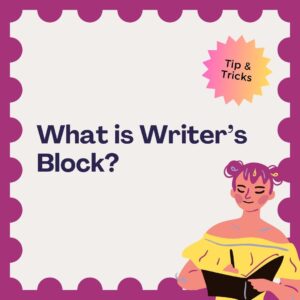What is Writer’s Block and How to Fight It: The Ultimate Guide for Aspiring Writers
Writer’s block is a common challenge that many writers face at some point in their creative journey. It can be frustrating and disheartening, leading to feelings of self-doubt and discouragement. However, understanding what writer’s block is, its causes and effective strategies to overcome it can empower you to regain your creative flow. This comprehensive guide will explore the nature of writer’s block and provide actionable tips to help you combat it.

Table of Contents
Definition of Writer’s Block
Writer’s block is a condition where a writer is unable to produce new work or experiences a creative slowdown, often feeling stuck or uninspired. It can manifest in various ways, including an inability to write, difficulty generating ideas, or a lack of motivation.
Types of Writer’s Block
There are several types of writer’s block that writers may encounter:
- Creative Block: Difficulty generating new ideas or concepts.
- Technical Block: Struggles with specific writing techniques or skills.
- Emotional Block: Feelings of anxiety, fear, or self-doubt that hinder writing progress.
- Situational Block: External factors such as distractions or life changes that impact writing.
Common Causes of Writer’s Block
Understanding the underlying causes of writer’s block can help you address it effectively:
- Perfectionism: The desire to produce flawless work can lead to paralysis and inhibit creativity.
- Fear of Failure: Worrying about how your writing will be received can create anxiety that stifles creativity.
- Lack of Inspiration: Sometimes, writers simply feel uninspired or disconnected from their work.
- Overwhelm: Facing a large project or tight deadlines can lead to feelings of being overwhelmed.
- Distractions: External distractions, such as noise or interruptions, can make it difficult to focus on writing.
The Emotional Impact of Writer’s Block
Writer’s block can have significant emotional effects on writers:
- Frustration: The inability to write can lead to feelings of frustration and helplessness.
- Self-Doubt: Writers may question their abilities and worth as authors during periods of blockage.
- Isolation: Struggling with writer’s block can make writers feel isolated from their peers and the writing community.
Recognizing these emotional impacts is essential for addressing them effectively.
Strategies to Overcome Writer’s Block
There are numerous strategies that writers can employ to combat writer’s block:
Establishing a Writing Routine
Creating a consistent writing routine can help train your brain to expect writing time:
- Set aside specific times each day dedicated solely to writing.
- Make writing a habit by committing to it regularly, even if it’s just for short bursts.
Example:
John Grisham famously wrote every morning at 5:30 AM before heading to his job as a lawyer.
Setting Realistic Goals
Setting achievable goals can help reduce feelings of overwhelm:
- Break larger projects into smaller, manageable tasks.
- Set daily word count goals or chapter completion targets.
Example:
Instead of aiming to finish an entire novel in one month, set a goal to write one chapter per week.
Creating a Conducive Writing Environment
Your writing environment plays a crucial role in your ability to focus:
- Choose a quiet space free from distractions where you feel comfortable.
- Personalize your workspace with items that inspire you, such as artwork or quotes.
Example:
Consider using noise-canceling headphones or playing soft instrumental music to create an atmosphere conducive to writing.
Utilizing Writing Prompts
Writing prompts can stimulate creativity and help you get started:
- Use prompts as warm-up exercises before diving into your main project.
- Explore different genres or themes through prompts to spark new ideas.
Example:
Try prompts like “Write about a character who discovers an old letter” or “Describe a day in the life of an alien on Earth.”
Freewriting Techniques
Freewriting involves writing continuously without worrying about grammar or structure:
- Set a timer for 10–15 minutes and write whatever comes to mind without stopping.
- This technique helps bypass your internal editor and encourages the flow of ideas.
Example:
Many writers find that freewriting leads them back into their main project with renewed energy.
Taking Breaks and Practicing Self-Care
Sometimes the best way to overcome writer’s block is to take a break:
- Step away from your writing for short periods; engage in activities that relax you.
- Practice self-care through exercise, meditation, or spending time outdoors.
Seeking Inspiration
Finding inspiration is key when facing writer’s block:
Tips for Seeking Inspiration:
- Read Widely: Explore books in different genres; reading can spark new ideas and perspectives.
- Engage with Art: Visit galleries, watch films, or listen to music that resonates with you creatively.
- Travel: New experiences and environments can provide fresh insights and ideas for your writing.
Engaging with Other Writers
Connecting with other writers can provide support and motivation:
Ways to Engage:
- Join Writing Groups: Participate in local or online writing communities where members share feedback and encouragement.
- Attend Workshops: Enroll in workshops that focus on specific aspects of writing; these environments foster collaboration and learning.
- Seek Accountability Partners: Pair up with another writer who shares similar goals; check in regularly on each other’s progress.
Professional Help and Resources
If you find yourself struggling with persistent writer’s block, consider seeking professional help:
Resources:
- Writing Coaches: Hiring a coach can provide personalized guidance tailored to your needs.
- Therapists: A mental health professional may help address underlying emotional issues contributing to writer’s block.
- Books on Creativity: Consider reading titles like The Artist’s Way by Julia Cameron for strategies on overcoming creative blocks.
Long-Term Strategies for Preventing Writer’s Block
In addition to immediate solutions, consider long-term strategies for maintaining creativity:
Tips for Prevention:
- Maintain a Regular Writing Habit: Consistency helps keep the creative juices flowing; make writing part of your daily routine.
- Set Aside Time for Reflection: Regularly reflect on your goals, progress, and challenges; this practice helps maintain focus on your aspirations as an author.
- Embrace Imperfection: Accept that not every piece will be perfect; allow yourself the freedom to write poorly during drafts without judgment.
Conclusion
Writer’s block is a common challenge faced by many authors but understanding its causes and employing effective strategies can help you overcome it! By establishing routines, setting realistic goals, creating conducive environments, seeking inspiration from various sources—and engaging with fellow writers—you’ll be well-equipped to navigate the ups and downs of the creative process!
Discover marketing services, interviews & publishing tools at SharingStories.




